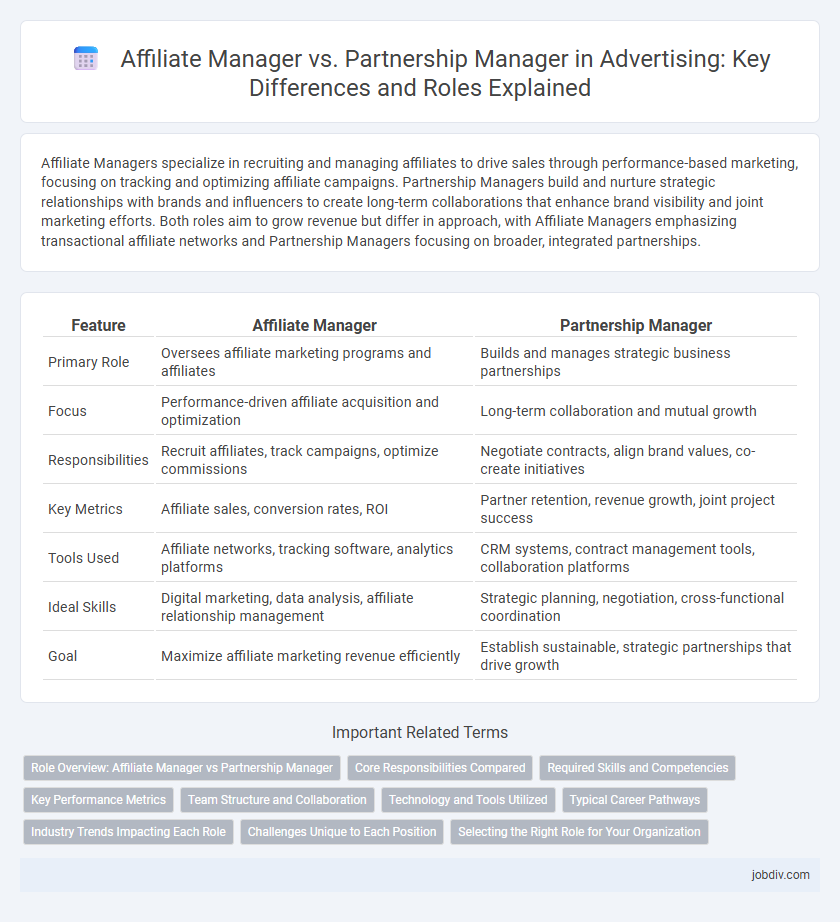Affiliate Managers specialize in recruiting and managing affiliates to drive sales through performance-based marketing, focusing on tracking and optimizing affiliate campaigns. Partnership Managers build and nurture strategic relationships with brands and influencers to create long-term collaborations that enhance brand visibility and joint marketing efforts. Both roles aim to grow revenue but differ in approach, with Affiliate Managers emphasizing transactional affiliate networks and Partnership Managers focusing on broader, integrated partnerships.
Table of Comparison
| Feature | Affiliate Manager | Partnership Manager |
|---|---|---|
| Primary Role | Oversees affiliate marketing programs and affiliates | Builds and manages strategic business partnerships |
| Focus | Performance-driven affiliate acquisition and optimization | Long-term collaboration and mutual growth |
| Responsibilities | Recruit affiliates, track campaigns, optimize commissions | Negotiate contracts, align brand values, co-create initiatives |
| Key Metrics | Affiliate sales, conversion rates, ROI | Partner retention, revenue growth, joint project success |
| Tools Used | Affiliate networks, tracking software, analytics platforms | CRM systems, contract management tools, collaboration platforms |
| Ideal Skills | Digital marketing, data analysis, affiliate relationship management | Strategic planning, negotiation, cross-functional coordination |
| Goal | Maximize affiliate marketing revenue efficiently | Establish sustainable, strategic partnerships that drive growth |
Role Overview: Affiliate Manager vs Partnership Manager
Affiliate Managers primarily focus on recruiting, managing, and optimizing relationships with individual affiliates and publisher networks to drive performance-based marketing campaigns. Partnership Managers oversee broader strategic collaborations with brands, agencies, or corporate partners, aiming to create long-term value through joint marketing initiatives and integrated business goals. Both roles require strong relationship-building skills but differ in scope, with Affiliate Managers concentrating on affiliate program growth and Partnership Managers managing comprehensive partnership ecosystems.
Core Responsibilities Compared
Affiliate Managers primarily focus on recruiting, managing, and optimizing relationships with affiliates to drive sales and track performance metrics such as conversion rates and commission payouts. Partnership Managers oversee broader strategic alliances, negotiating terms and fostering collaboration beyond affiliates, including co-marketing campaigns and joint ventures. Both roles require strong relationship management but differ in scope, with Affiliate Managers targeting performance-driven affiliate networks and Partnership Managers managing diverse business partnerships to enhance brand growth.
Required Skills and Competencies
Affiliate Managers require strong skills in digital marketing, campaign optimization, and data analysis to drive performance across affiliate networks. Partnership Managers excel in negotiation, relationship management, and strategic collaboration to build and maintain long-term business alliances. Both roles demand excellent communication, analytical thinking, and a deep understanding of market trends to maximize ROI and growth opportunities.
Key Performance Metrics
Affiliate Managers primarily track key performance metrics such as cost per acquisition (CPA), conversion rates, and return on ad spend (ROAS) to optimize affiliate campaigns and maximize revenue. Partnership Managers focus on long-term relationship metrics including partner retention rate, joint revenue growth, and deal velocity to ensure sustainable business collaborations. Both roles leverage data-driven insights but emphasize distinct KPIs aligned with short-term campaign success versus strategic partnership development.
Team Structure and Collaboration
Affiliate Managers concentrate on cultivating and managing relationships with individual affiliates to drive targeted traffic and sales, often working within dedicated affiliate teams. Partnership Managers oversee broader strategic alliances with other companies or brands, integrating cross-functional collaboration across sales, marketing, and product teams to maximize mutual business growth. Effective team structures distinguish these roles by aligning Affiliate Managers with performance-based marketing units while embedding Partnership Managers within larger partnership or business development teams to facilitate comprehensive collaboration.
Technology and Tools Utilized
Affiliate Managers primarily utilize affiliate tracking software such as HasOffers and Impact to monitor performance, optimize campaigns, and manage publisher relationships within digital marketing networks. Partnership Managers leverage Customer Relationship Management (CRM) platforms like Salesforce and collaboration tools such as Slack to foster strategic alliances and coordinate cross-functional initiatives. Both roles increasingly depend on data analytics software like Google Analytics and Tableau to analyze metrics and drive decision-making in advertising strategies.
Typical Career Pathways
Affiliate Managers often begin their careers in digital marketing or sales roles, gradually specializing in managing affiliate networks, optimizing performance, and negotiating commission structures. Partnership Managers typically move from business development or account management positions, focusing on building strategic alliances, fostering long-term collaborations, and driving mutual business growth. Both paths demand strong communication skills and analytical capabilities but diverge in their focus on either performance-based affiliate channels or broader partnership ecosystems.
Industry Trends Impacting Each Role
Affiliate managers focus on optimizing performance-driven marketing channels, leveraging data analytics and CPA models to drive conversions and ROI. Partnership managers emphasize strategic collaborations, nurturing long-term brand alliances and co-marketing initiatives that enhance market penetration and customer lifetime value. Industry trends such as influencer marketing growth and the rise of platform-based ecosystems are reshaping both roles, with affiliate managers adapting to technology integrations and partnership managers expanding cross-industry networks.
Challenges Unique to Each Position
Affiliate Managers face challenges in tracking and optimizing numerous individual affiliate performances, ensuring compliance with program rules while managing diverse payout structures. Partnership Managers encounter difficulties in cultivating long-term strategic alliances, aligning brand goals with partner objectives, and navigating complex contract negotiations. Both roles demand expertise in relationship management but require distinct approaches tailored to their specific stakeholder dynamics and performance metrics.
Selecting the Right Role for Your Organization
Choosing between an Affiliate Manager and a Partnership Manager depends on your organization's marketing goals and relationship scope. An Affiliate Manager focuses on driving sales through performance-based affiliate networks, optimizing commissions, and tracking conversions, ideal for organizations aiming at scalable revenue growth. A Partnership Manager develops strategic collaborations beyond affiliates, including brand partnerships and co-marketing initiatives, making this role suitable for businesses targeting long-term brand equity and cross-industry expansion.
Affiliate Manager vs Partnership Manager Infographic

 jobdiv.com
jobdiv.com